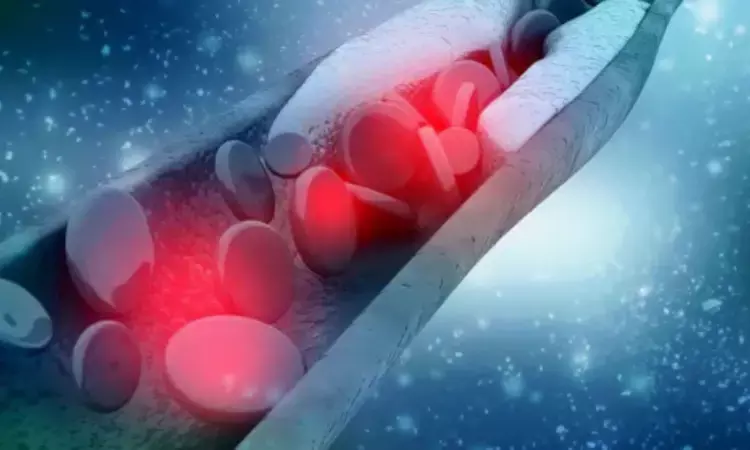- Home
- Medical news & Guidelines
- Anesthesiology
- Cardiology and CTVS
- Critical Care
- Dentistry
- Dermatology
- Diabetes and Endocrinology
- ENT
- Gastroenterology
- Medicine
- Nephrology
- Neurology
- Obstretics-Gynaecology
- Oncology
- Ophthalmology
- Orthopaedics
- Pediatrics-Neonatology
- Psychiatry
- Pulmonology
- Radiology
- Surgery
- Urology
- Laboratory Medicine
- Diet
- Nursing
- Paramedical
- Physiotherapy
- Health news
- Fact Check
- Bone Health Fact Check
- Brain Health Fact Check
- Cancer Related Fact Check
- Child Care Fact Check
- Dental and oral health fact check
- Diabetes and metabolic health fact check
- Diet and Nutrition Fact Check
- Eye and ENT Care Fact Check
- Fitness fact check
- Gut health fact check
- Heart health fact check
- Kidney health fact check
- Medical education fact check
- Men's health fact check
- Respiratory fact check
- Skin and hair care fact check
- Vaccine and Immunization fact check
- Women's health fact check
- AYUSH
- State News
- Andaman and Nicobar Islands
- Andhra Pradesh
- Arunachal Pradesh
- Assam
- Bihar
- Chandigarh
- Chattisgarh
- Dadra and Nagar Haveli
- Daman and Diu
- Delhi
- Goa
- Gujarat
- Haryana
- Himachal Pradesh
- Jammu & Kashmir
- Jharkhand
- Karnataka
- Kerala
- Ladakh
- Lakshadweep
- Madhya Pradesh
- Maharashtra
- Manipur
- Meghalaya
- Mizoram
- Nagaland
- Odisha
- Puducherry
- Punjab
- Rajasthan
- Sikkim
- Tamil Nadu
- Telangana
- Tripura
- Uttar Pradesh
- Uttrakhand
- West Bengal
- Medical Education
- Industry
Osteoporosis Medications Denosumab and Alendronate Have No Significant Effect on Vascular Calcification: SALTIRE2

UK: In a recent secondary analysis of the SALTIRE2 randomized controlled trial, researchers have found that commonly prescribed osteoporosis medications—denosumab and alendronate—do not significantly affect vascular calcification. The study's findings, published in the Journal of the American Heart Association, provide new insights into the relationship between bone health treatments and cardiovascular health.
"Osteoporosis treatments, including alendronic acid (Fosamax) and denosumab (Prolia), did not help with coronary or aortic calcification," the researchers reported. The findings indicate that these drugs neither promote nor inhibit vascular calcification.
Denosumab, a monoclonal antibody that inhibits bone resorption by targeting RANKL, and alendronate, a bisphosphonate that reduces bone loss by inhibiting osteoclast activity, have been the cornerstone of osteoporosis management for years. While osteoporosis is associated with increased vascular calcification, the impact of osteoporosis treatments on this condition remains uncertain. To fill this knowledge gap, Jolien Geers, BHF Centre for Cardiovascular Science University of Edinburgh Edinburgh UK, and colleagues aimed to investigate whether coronary or aortic calcification is influenced by denosumab and alendronic acid treatment.
For this purpose, the researchers conducted the double-blind randomized controlled SALTIRE2 trial (Study Investigating the Effect of Drugs Used to Treat Osteoporosis on the Progression of Calcific Aortic Stenosis). In this study, patients with aortic stenosis were randomly assigned in a 2:1:2:1 ratio to receive denosumab, placebo injection, alendronic acid, or placebo capsule.
The participants underwent serial imaging using computed tomography and 18F-sodium fluoride positron emission tomography to evaluate vascular calcium burden and calcification activity, respectively. The prespecified secondary analyses focused on changes over 24 months in coronary calcium score and 12 months in thoracic aorta calcium score, as well as in the 18F-sodium fluoride activity in both coronary and aortic regions.
The following were the key findings of the study:
- One hundred fifty patients with aortic stenosis (72±8 years; 21% female) were randomized to denosumab (n=49), alendronic acid (n=51), and placebo (injection n=25, capsule n=25).
- There were no differences in change in coronary calcium scores between placebo (16 Agatston units) and either denosumab (94 Agatston units) or alendronic acid (34).
- There were no differences in change in thoracic aorta calcium scores between placebo (132 Agatston units) and either denosumab (118) or alendronic acid (116 Agatston units).
- There were no differences in changes in coronary or aortic 18F‐sodium fluoride activity between treatment groups.
The findings revealed that neither alendronic acid nor denosumab affected the activity or progression of coronary or aortic calcification.
"The results suggest that osteoporosis treatments do not significantly impact vascular calcification associated with atherosclerosis," the researchers concluded.
Reference:
Geers J, Bing R, Pawade TA, Doris MK, Daghem M, Fletcher AJ, White AC, Forsyth L, Evans E, Kwieciński J, Williams MC, van Beek EJR, Kwak S, Peeters FECM, Tzolos E, Slomka PJ, Lucatelli C, Ralston SH, Prendergast B, Newby DE, Dweck MR. Effect of Denosumab or Alendronate on Vascular Calcification: Secondary Analysis of SALTIRE2 Randomized Controlled Trial. J Am Heart Assoc. 2024 Sep 9:e032571. doi: 10.1161/JAHA.123.032571. Epub ahead of print. PMID: 39248270.
Dr Kamal Kant Kohli-MBBS, DTCD- a chest specialist with more than 30 years of practice and a flair for writing clinical articles, Dr Kamal Kant Kohli joined Medical Dialogues as a Chief Editor of Medical News. Besides writing articles, as an editor, he proofreads and verifies all the medical content published on Medical Dialogues including those coming from journals, studies,medical conferences,guidelines etc. Email: drkohli@medicaldialogues.in. Contact no. 011-43720751


